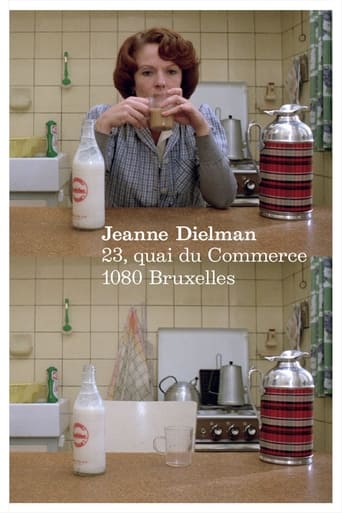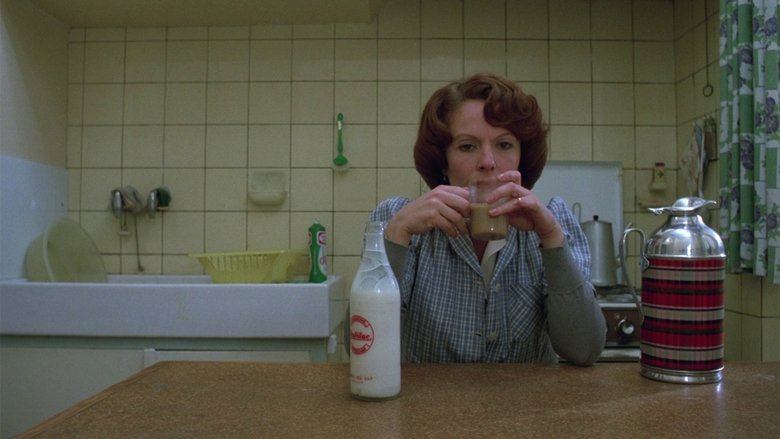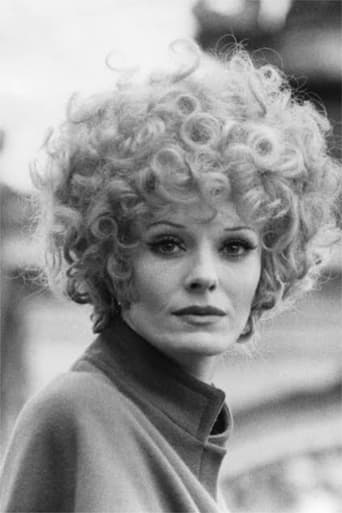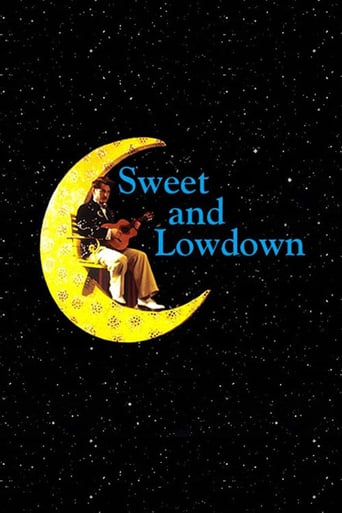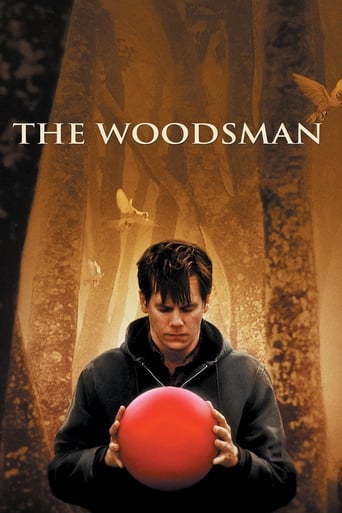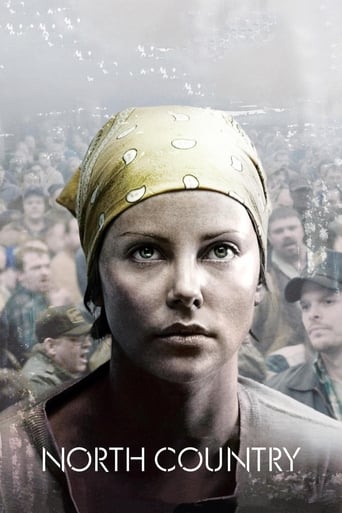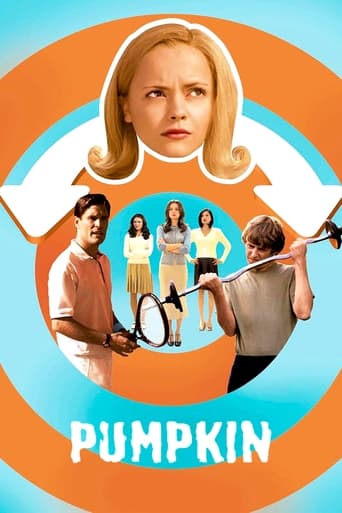Jeanne Dielman, 23, quai du Commerce, 1080 Bruxelles (1983)
A lonely widowed housewife does her daily chores and takes care of her apartment where she lives with her teenage son, and turns the occasional trick to make ends meet. Slowly, her ritualized daily routines begin to fall apart.
Watch Trailer
Cast


Similar titles
Reviews
A lot more amusing than I thought it would be.
Fun premise, good actors, bad writing. This film seemed to have potential at the beginning but it quickly devolves into a trite action film. Ultimately it's very boring.
It's the kind of movie you'll want to see a second time with someone who hasn't seen it yet, to remember what it was like to watch it for the first time.
It's the kind of movie you'll want to see a second time with someone who hasn't seen it yet, to remember what it was like to watch it for the first time.
Three consecutive days are covered in the life of the title character (played by Delphine Seyrig), a middle-aged widow who cares for her teenaged son in the morning and evening, and does various errands in the afternoon. One of those errands seems very surprising for someone whose routine is rather rigid.There are various reasons to think this movie might not work. It's over three hours; the camera is almost always on one character; she is mostly alone and even with others, there is rare conversation. With the exception of a shocking ending, most of the time is spent on the ordinary routines of life. Despite these challenges that would fail with other film-makers, this movie succeeds in a fascinating way mainly due to Seyrig and writer-director Chantal Akerman. By the end, one realizes the movie HAD to be so long to make its point.The ending is so surprising that an initial reaction might be to reject its apparent absurdity. Yet, one cannot help but backtrack to find clues that may have lead to it.Might it be that Jeanne was starting to find an unexpected pleasure in one of her errands and that threw her off her usual sense of being very organized?This film succeeds in causing viewers to think well after the movie, a true sign of greatness. For those of us who are "loners" like Jeanne, we are forced to examine our lives. Living in this earthly plane, we are almost forced to have a routine to survive; but when does the routine become a problem?"Jeanne Dielman" might also be considered ahead of its time in exposing mental illness, signs that are apparent as we often see the despair on Jeanne's face as she stares into space.At the and of the film, I said to a long-time cinephile friend sitting to next to me, "Now that was definitely an ART film." Usually, I'm condescending whenever I say that. In this case, I meant it as a compliment.OUTSTANDING ACHIEVEMENT: Directing by Chantal Akerman
A tribute to the late cinema avant-gardist Chantal Akerman, who committed suicide one month earlier at the age of 65, which stroke as a big shock for auteurist cineastes, despite of the fact that her works have never been acknowledged as festival darlings, or enticed into mainstream filmmaking. JEANNE DIELMAN is her most well-known achievement, a minimalist masterpiece came out 40-years ago, made by her at a young age of 25, Akerman is such a staunch and pioneering saboteur to subvert audience's customary viewing experience and triumphs, which only makes us more regret about her untimely departure.The title refers to the address of Jeanne (Seyrig)'s one-bedroom only apartment, she is a comely widow living with her son Sylvain (Decorte), now a high-schooler, who sleeps on the sofa bed in the living room. The picture runs over 3 hours, spans across 3 days, more precisely, a little longer than 2 entire days, and notably installs long static shots (through various angles) to observe Jeanne doing her daily chores in a mechanically arranged order. From day 1, in the afternoon, 3 minutes into the film, Akerman cunningly stimulates audience with curiosity through the introduction of Jeanne's profession (conveniently she works at home), then, indefatigably details her routines, preparing her 2-course dinner, eating dinner with Sylvain, helping him with homework, reading to him the letter from her sister in Canada, then both take a mysterious night-walk outside before sleeping. Day 2, she wakes up, prepares breakfast, cleans Sylvain's shoes, after he goes to school, she goes out to the post office, grocery, enjoys her coffee break in the bar, takes care of her neighbour's infant, then again prepare food, welcomes a new client, it is a circle meticulously presented and purposefully defies any empathy, thanks to the retiring nature of the mother-and-son pair.Things goes slightly different in the second circle, firstly the overcooked potato (alleged because her customer has overstayed his time) causes their dinner delayed a bit, but they stick to the routine of night-walk, and a terse before bedtime convo with Sylvain stirs Jeanne (sexual activity and pain, an awkward topic between mother and her son), then day 3, the routine goes on, but Jeanne seems to unnoticeably disquieted, being clumsy in the kitchen, maybe because she wonders why the gift from her sister still hasn't arrived, but the coffee suddenly tastes bad, and she cannot find the right button for Sylvain's coat, even in the bar, her usual spot is taken and is served by a new waitress, also neighbour's baby cannot stop crying when she fondly holds her (the only time Jeanne reveals some evident emotion), there is an understated disintegration in the making. Finally, her sister's gift arrives, but also arrives is another client, she barely have time to try the present, and a scissor is left in the boudoir. The long-awaited twist breaks out abruptly, completely terminates the experimental patience-test which meanders near 3 hours, moreover, it intrigues immensely about the rationalism behind Jeanne's behaviour, feminist stance is an easy explanation, but, too literal, a pattern-disruption angle could be more felicitous, Jeanne is an animal of habitual routines, so is the approach towards her means of livelihood, when this pattern is steadily breached in day 3, she simply cannot take it anymore. The origin of the impulse (apart from Jeanne's taciturn nature) can be traced back to the intangible suppression of the society unleashes on woman, especially a single-mother, Akerman scarcely shows any interactions between Jeanne and the outer world, understandably she is protective of her privacy, but the entire atmosphere is not healthy.Some film offers a 2-hour roller-coaster ride then after that it vanishes completely, some instead lulls you into a claustrophobic snooze-fest, but if you can survive it, its repercussions can mark forever in one's head, this film is a paradigm of the latter, bravo for Chantal Akerman! One final comment, Delphine Seyrig is such an mysteriously elegant actress, although most of time she has to act like a cipher in an installation, she can hold viewers spellbound, whether she is peeling potatoes, washing dishes or taking the elevator ups-and-downs.
Belgian screenwriter, film professor, actress, producer and director Chantal Anne Akerman's third feature film which she wrote, is based on her own childhood memories and observations of women and their ways of life. It premiered in the Director's Fortnight section at the 28th Cannes International Film Festival in 1975, was shot on location in Brussels, Belgium and is a Belgium-France co-production which was produced by producers Corinne Jenart and Evelyne Paul. It tells the story about a middle-aged working-class woman named Jeanne who lost her husband years ago and who still lives in the same apartment in the city of Brussels with her son named Sylvain who is a student at a Flemish school. Jeanne makes a living as a sex worker and a daytime child-minder for one of her neighbors children, but her solitary and exaggeratedly organized life which mainly consists of cooking, cleaning, shopping and assisting her son with his homework is slowly altering.Distinctly and statically directed by Belgian filmmaker Chantal Akerman, this quietly paced fictional tale which is narrated mostly from the main character's point of view, draws a heartrending and both intimate and distant portrayal of three days during a week in a dutiful widow and caring mother's life which is marred by her commitment to her daily routines. While notable for it's naturalistic and mostly interior milieu depictions, sterling art direction by art director and production designer Philippe Graff, cinematography by French cinematographer and director Babette Mangolte, costume design, fine editing by film editor Patricia Canino and use of colors, light and sound, this character-driven story which compassionately examines themes like gender roles, prostitution and the conditions of women depicts a dense and internal study of character where the protagonist, who all though hardly ever smiling, keeps up a brave face, and her repetitive gestures creates the continuity.This unsentimental, at times rhythmic and acutely framed drama from the mid-1970s which is set in the capital of Belgium where a war survivor who spends most of her time in her kitchen and who for personal and understandable reasons lives in a self-made prison of rituals which she thinks protects her from the non-existing dangers she thinks might occur if she changes anything, is impelled and reinforced by it's cogent narrative structure, subtle character development and continuity, modest atmosphere, sparse dialog, moments of silence, underlying emotional tension, sense of time and space and the understated, physical and reverent acting performance by Lebanese actress Delphine Seyrig (1932-1990). A minimalistic, climactic and inventive piece of artistic cinema and a pointed political and cinematic statement which may not be the most heart-warming or humorous narrative feature, but undeniably brave and commendably executed by a then 25-year-old filmmaker.
Three plus hours of tedium, amateur actors obviously staring away from the camera. Hours of endless household routine over and over again, only to be climaxed by an awful B movie ending. I wouldn't say that this is the worst movie ever because I don't think it deserves that distinction. But given that the director had the resources to make a decent movie just makes it that much the worse. At least with a B movie you can blame it on the budget. As I am required to write ten lines for a review on a movie that hardly deserves one line. I feel compelled to comment on other reviews of this colossal sleeping pill. If you found this movie to be hypnotic perhaps it is from the annoying unexplained blue flashing light. If you found it intriguing perhaps you should try watching grass grow.

